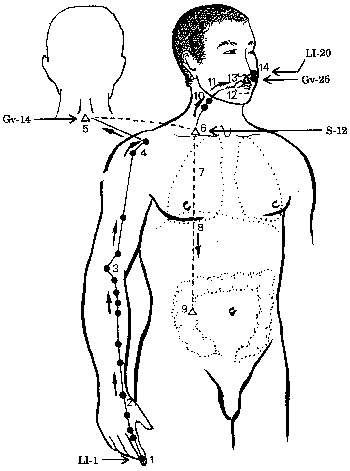Here will briefly review the twelve primary Qi channels along with the eight extraordinary meridians. You should also know the organ's Yin and Yang. In our body, there are six Yang organs and six Yin organs. Each Yang organ is associated with and harmonized by a Yin organ. Paired Yin and Yang organs belong to the same phase in the Five Phases. Their channels are sequential to each other in the circulation of Qi, their functions are closely related, and disease in one usually affects the other. In Chinese medicine, the channel corresponding to the Yang organ is often used to treat disorders of its related Yin organ.
In the limbs, the Yang channels are on the external side of the limbs while the Yin channels are on the internal side. Generally speaking, the outsides of the limbs are more Yang and are more resistant and prepared for an attack, while the internal sides are more Yin and weaker.
The organs are further subdivided in order to distinguish the different levels of the Yin/Yang characteristics. The Yang organs are divided into Greater Yang (Taiyang), Lesser Yang (Shaoyang), and Yang Brightness (Yangming). The Yin organs are divided into Greater Yin (Taiyin), Lesser Yin (Shaoyin), and Absolute Yin (Jueyin). In the following discussion, all of the classifications will be shown in the title, for example: the Lung Channel of Hand Greater Yin.
Lung Channel of Hand Greater Yin
The lungs (Yin) and the large intestine (Yang) are considered paired organs. They belong to Metal in the Five Phases, the westerly direction, the season of autumn, the dry climatic condition, the color white, the pungent taste, the rank odor, the emotion of sadness, and the sound of weeping. Their opening is the nose, and they govern skin and hair.
In Qigong practice, since the lungs belong to Metal, they are able to regulate heartburn. The heart belongs to Fire. Whenever the heart has excess Qi, deep breathing is able to lead the heart's fire to the lungs, and therefore cool the heartburn. When the weather is changing from damp, hot summer into dry and cool autumn, lungs are the first organ to sense the change. If your lungs are not able to readjust themselves to fit the new situation smoothly, you will catch a cold. The lungs access the outside world through your nose. The lungs are responsible for taking Qi from the air, and for the energy (Qi) state of the body.
Breathing is considered a strategy for leading Qi to the extremities such as skin and hair. When your breathing is regulated properly, you are able to strengthen your body's Guardian Qi and generate an expansive Qi shield to protect your body. You are also able to raise or lower your Qi state through your breathing. For example, when you are angry, deep breathing is able to calm your excited Qi state.
The lungs are sensitive to emotional changes, especially when you are sad or angry. They also control that part of the liquid metabolism which distributes liquid to the skin.
Because the lungs are usually the first to be attacked by exogenous diseases, they are called the Delicate Organ. These diseases can also cause what is called the Non-Spreading of the Lung Qi. The main symptom of a problem with the lungs is coughing, which is a form of Rebellious Qi (since the lung Qi normally flows downward). If coughing is also accompanied by lassitude, shortness of breath, light foamy phlegm, and weakness in the voice, it is called Deficient Lung Qi. However, if the cough is a dry one, with little phlegm, a parched throat and mouth, and Deficient Yin symptoms (such as night sweating, low grade fever, red cheeks, etc.), the condition is referred as Deficient Lung Yin.
Large Intestine Channel of Hand - Yang Brightness
The lungs (Yin) and the large intestine (Yang) are considered paired organs. They belong to Metal in the Five Phases, the westerly direction, the season of autumn, the dry climatic condition, the color white, the pungent taste, the rank odor, the emotion of sadness, and the sound of weeping. Their opening is the nose, and they govern skin and hair. The main function of the large intestine is the metabolism of water and the passing of water. It extracts water from the waste material received from the small intestine, sends it on to the urinary bladder, and excretes the solid material as stool. Many disorders affecting this organ are categorized as spleen and stomach patterns. Certain abdominal pains are considered manifestations of a blockage of Qi or blood in the large intestine.
In Qigong, the Dan Tian in the lower abdomen is considered the residence of Original Qi. In order to keep this Qi at its residence, this area must be strong and healthy. The Qi circulating around the intestines must not be stagnant. When you practice Qigong you must learn how to regulate your breathing to smooth the Qi flow in the large intestine and the lungs. This will allow you to relax the front of your body and regulate the Qi flow in the other organs.
End of Part 1


